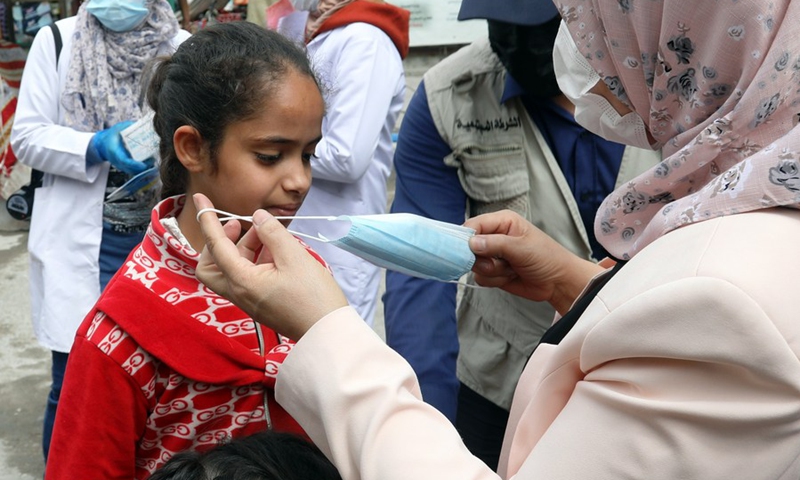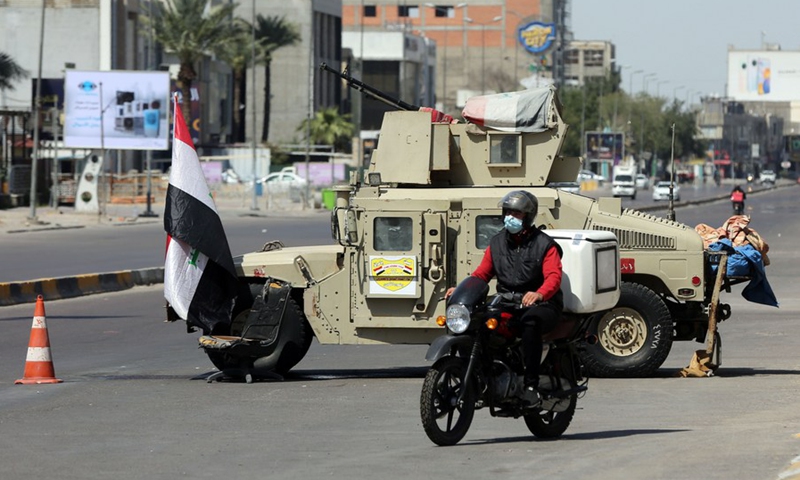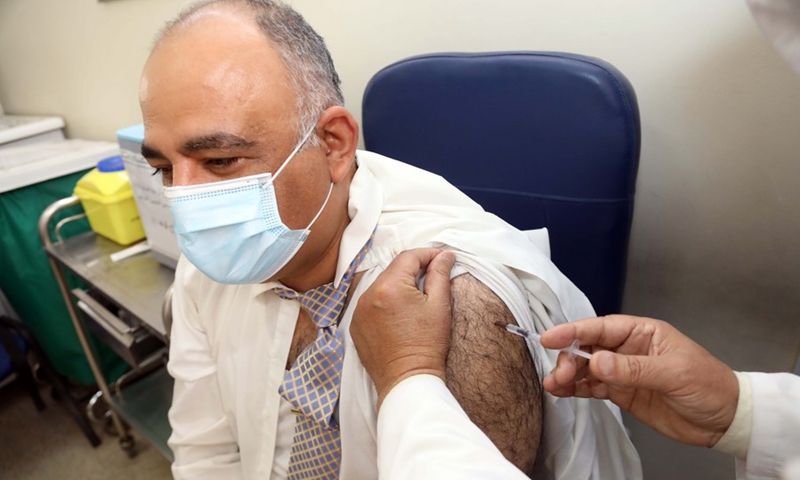Iraq's COVID-19 cases exceed 800,000 as infections surge threatens to collapse health system

A medical worker helps a girl wear face mask during a COVID-19 awareness and detection campaign in Baghdad, Iraq on March 23, 2021.(Photo: Xinhua)

A delivery worker passes a mobile checkpoint set up as part of the restrictive measures to curb the spread of COVID-19 in Baghdad, Iraq, on March 19, 2021.(Photo: Xinhua)

A medical worker receives a dose of China-donated COVID-19 vaccine in Baghdad, Iraq, March 7, 2021.(Photo: Xinhua)

Photo taken on March 2, 2021 shows the COVID-19 vaccines donated by China at an airbase in Baghdad, Iraq.(Photo: Xinhua)
The Iraqi Ministry of Health said on Tuesday that the total number of COVID-19 infections in Iraq has surpassed 800,000, as the 5,000-plus daily infections in recent days threaten to collapse the health system of the war-torn country.
A statement by the ministry warned of the seriousness of the epidemiological situation.
"The continued high infection rate will pose a great danger to the health system, especially when health institutions are unable to deal with critical cases, which leads to an increase in the number of deaths," the ministry statement said.
According to the statement, about 50 percent of the cases died in 48 hours after hospitalization because of the delay in their admission to hospitals.
Sayf al-Badr, spokesman of the health ministry, said in a press release that Iraq is "entering a new wave of the pandemic, especially after the spread of the new strain of coronavirus known for its severity and faster transmission and its ability to infect young people and children."
On Saturday, Minister of Health Hassan al-Tamimi warned of "stormy days ahead" as the public fail to follow health protective measures will lead to a "great disaster."
"Our health institutions cannot deal with millions of infections," he said.
The Iraqi health ministry has worked to increase the number of laboratories for testing coronavirus, from only one at the beginning of the pandemic to more than 70 now, as well as the capacity of hospitals by opening several makeshift ones across the country.
However, the ministry's efforts have been met with the failure of the citizens to adhere to the health protective measures and of the government institutions to enforce the measures.
According to al-Badr, the non-compliance with health instructions is mainly due to the lack of education and health awareness among citizens.
Hussein Abdul-Amir from Abu Graib Hospital, some 20 km west of the capital Baghdad, told Xinhua that the health institutions, like other government ones, have been overcome by neglect and corruption since the U.S.-led invasion of Iraq in 2003.
"The long failure of the Iraqi institutions created a state of mistrust between the citizens and state institutions, and this is exactly what pushed most of COVID-19 infected people to refrain from going to government hospitals," Abdul-Amir said.
During the past weeks, the Iraqi authorities have taken a series of restrictive measures to curb the recent rise in infections after the health ministry announced on Feb. 15 the detection of a new strain characterized by faster transmission and a higher level of severity.
However, the economic difficulties have forced the government to ease COVID-19 restrictions, such as imposing a full curfew on Fridays and Saturdays every week, instead of Fridays, Saturdays and Sundays.
The government also has shortened the partial curfew and decided to reopen malls, shops, restaurants, and cafes under strict health measures after March 22.
Earlier in the month, the Sinopharm vaccine donated by the Chinese government to combat the COVID-19 pandemic arrived in Iraq's capital Baghdad, after the Iraqi National Board for Selection of Drugs approved the emergency use of the Chinese vaccine, in addition to Britain's AstraZeneca, America's Pfizer-BioNTech, and Russia's Sputnik V vaccines.
